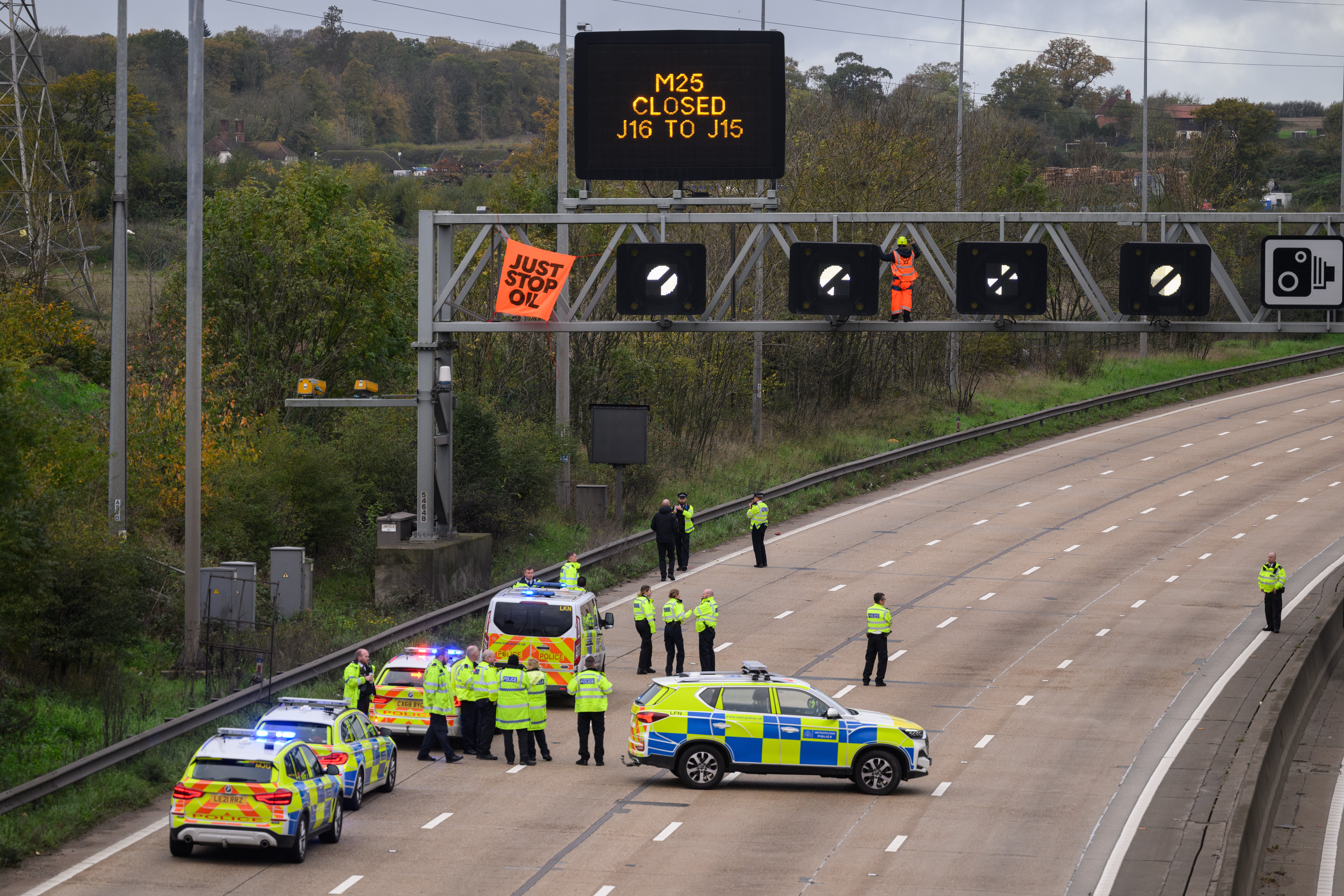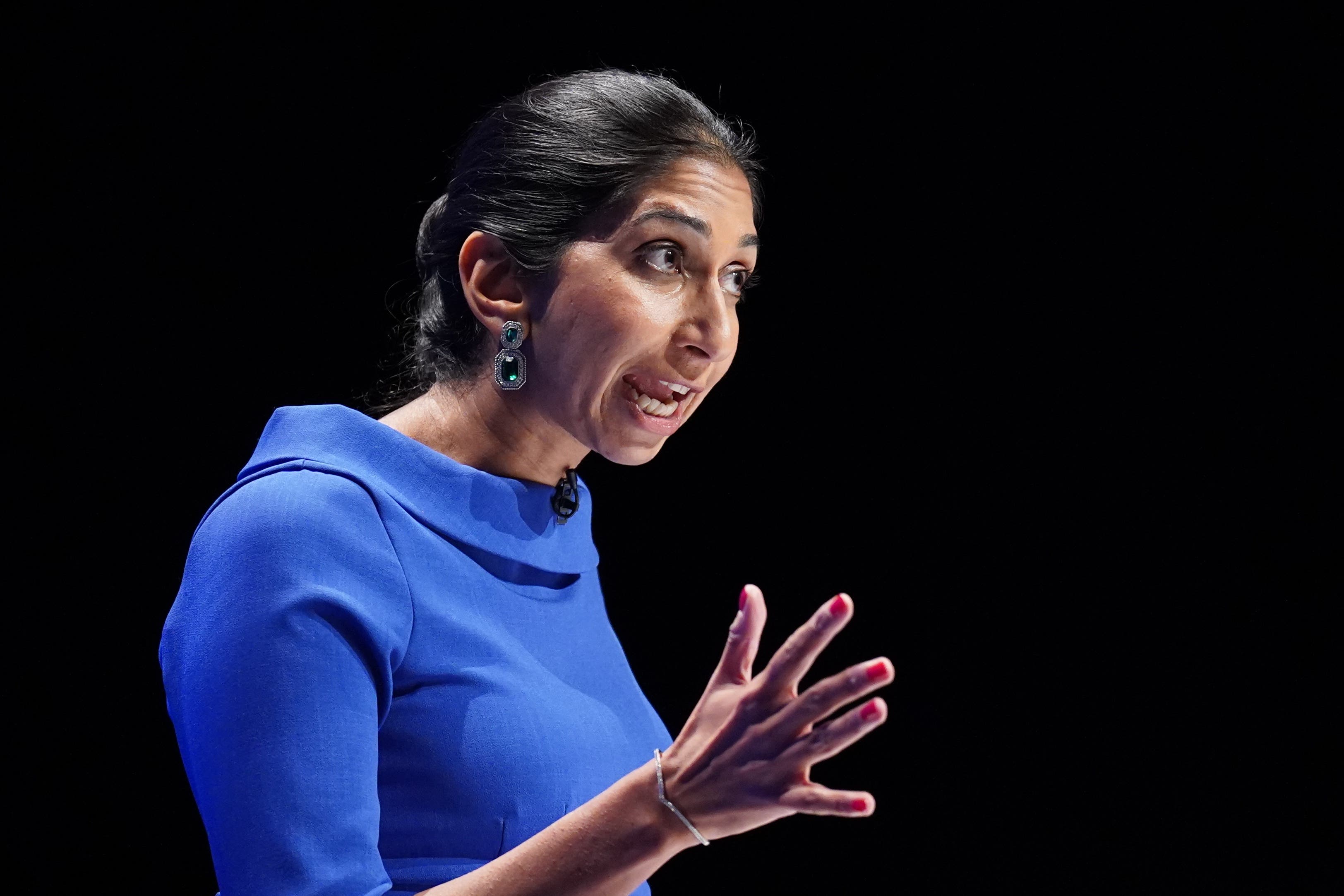Just Stop Oil: Police chief says officers uphold ‘liberal democracy’ after Braverman demands crackdown
‘We’re not going to arrest our way out of environmental protest’ warns policing leader

A police leader has defended the “absolutely appropriate” response to Just Stop Oil after Suella Braverman called for tougher action.
Chief constable Chris Noble, the National Police Chiefs’ Council (NPCC) lead for protests, defended the approach taken to days of disruptive action targeting the M25.
It came after the home secretary told a conference of police leaders it was their “duty to take a firmer line to safeguard public order” and accused them of an “institutional reluctance” to use their powers against protesters.
Labelling Just Stop Oil extremists, Ms Braverman added: “I urge you all to step up to your public duties in policing protests. The law-abiding patriotic majority is on your side.”
But Mr Noble said officers were taking proactive action when they could, responding quickly and making numerous arrests resulting in charges.
“That for me is an absolutely appropriate response for what we’re dealing with,” Mr Noble added.
“We are open to feedback, we haven’t always got the balance right in the past, but from my perspective, we operate within the law and we’ve got a responsibility to make sure what we do is proportionate.”
Asked by The Independent whether the police response to Just Stop Oil would change following the home secretary’s call, he responded: “There’s a fair challenge about how effectively we are dealing with these particular protests but we operate according to the law, we work within a liberal democracy and the answer to some of the challenges we face is not a policing answer.
“We’re part of it but we’re not going to arrest our way out of environmental protest.”
Several people have been arrested and charged over this week’s demonstrations, while three journalists detained while reporting on Just Stop Oil’s action were released without further action.
Following outrage over the arrests, the elected police and crime commissioner for Hertfordshire admitted that police “got it wrong” but then accused journalists of “facilitating the protests”.
During a panel debate on protests at the NPCC’s annual summit, David Lloyd said: “The editorial decisions that many organisations are taking on reporting Just Stop Oil mean that more protests are happening … you’ve got to ask a question as a journalist with a camera, are you facilitating, are you making the news or are you reporting the news?”

He denied calling for censorship but suggested that media outlets ask themselves if they are “serving the country best by adding fuel to the flames”.
Several media freedom and human rights groups raised alarm over Mr Lloyd’s comments, with Liberty calling suggestions for the media to change their coverage a “dangerous overreach”.
OpenDemocracy said it was journalists’ job to report the facts, “not to censor events to suit the authorities”, while Index on Censorship added: “A cornerstone of media freedom is allowing newsrooms to decide what they want to prioritise.”
Senior police officers appearing at the NPCC conference did not back Mr Lloyd’s remarks on media coverage of Just Stop Oil.
Mr Noble called press freedom fundamental and said “On the vast majority of occasions there shouldn’t be any need to intervene with journalists at a protest at all.”
Speaking in the same debate, the policing minister Chris Philp said: “Journalists who are going about their lawful business reporting the news as they see fit should obviously not be subject to arrest.”
Mr Noble called Just Stop Oil’s tactics, in which activists attach themselves to motorway gantries, “unreasonable and criminal” and accused them of putting lives at risk.
But he said that police had a legal duty to balance the rights of demonstrators against the rights of the wider public when taking any action.

The home secretary has said she wants new guidance for police to stop a “restrictive interpretation of legislation” so they use a controversial package of enhanced protest laws more frequently.
One of the new statutory offences brought in earlier this year, public nuisance, has been used against Just Stop Oil activists in recent days but previously the pre-existing offence of highway obstruction has been commonly used.
Parliament is currently considering a new package of protest laws in the Public Order Bill, which brings back measures rejected by the House of Lords for being too “draconian”.
They include the power to ban individuals from protesting, criminalise “locking on” and stop and search people for any equipment that could be used for that purpose.
Mr Noble said he could see the value in that change but that police leaders had asked the government for clarity on the meaning of parts of the planned law.
“It’s not as simple as making new legislation and there’s no longer a challenge there – that’s not reality,” he warned.
The policing minister told the conference the new law would bring “sensible, proportionate measures, which will help the police protect the public from unreasonable disruption”.
Join our commenting forum
Join thought-provoking conversations, follow other Independent readers and see their replies
Comments


Bookmark popover
Removed from bookmarks